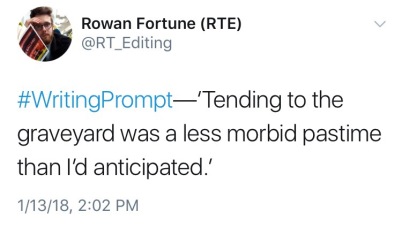When you try something new, your expectations are set quite high. Some people give up on the new thing when it becomes too difficult or when the high expectations they set for themselves aren’t showing.
Last year I decided to join in on the first #FlashFicHive challenge (hosted by Anjela Curtis). This month-long event challenged writers to create flash fiction stories based on all sorts of topics and prompts.

I’ll admit, I didn’t do so well at keeping up that month or in the following challenges (every other month, which is set to change to a weekly hashtag event starting February 1, 2018).
However, I did learn a lot about writing flash fiction (other than the 1,000-word limit). These skills, which I’m going to share with you, are continuing to help me as I attempt to hone flash fiction in a new goal this year — #52weeks52stories challenge (hosted by Hollie Hausenfluck and Avrin Kelly).
Lesson 1: Start in medias res.
Do you remember this term from high school English class? For some reason, I do. I’m not sure what it was in regards to, but I do remember hearing it in class.
In medias res is Latin for “in the midst of things” — English for “in the middle.”
A flash fiction story most often starts in the middle of the story — at the beginning of the conflict. There aren’t enough words allotted in flash fiction to start with a bunch of fluffy exposition, so the best thing to do is show your character gearing up for the climax.
Lesson 2: Write first without concern for word limits.
It’s true: flash fiction has a word limit. If we wrote the first draft with a limit in mind, then we’d end up missing key pieces to our story.
Therefore, the first draft should be written without any thought to the 1,000-word limit. You can worry about that later when you revise and edit.
Lesson 3: Sometimes you will need to tell instead of show…
*Picks up writer’s notebook to hide behind before going on…*
Of all the advice we writers hear day in and day out, “show don’t tell” resonates the most. We’re always trying to create the perfect image in our reader’s mind.
One-thousand words doesn’t leave a whole lot of room for pretty little descriptions and extensive characterizations. Sometimes a character is simply an old man with a cane instead of the paragraph or two it would take to describe him.
“I’d rather let the reader supply the faces, the builds, and the clothing as well.”
-Stephen King, On Writing
With flash fiction, sometimes we need to let the reader do a little work… Let the reader imagine what the old man looks like.
Lesson 4: Dialogue can leave clues.
A flash fiction story will likely hold clues for the reader throughout, clues that many readers won’t catch until their second read-through. A great place to stash those clues is in the words spoken by the characters.

Not only does dialogue help the writer leave clues, but it’s another way for character building. What they say in combination with what they do can help the reader better understand the story and relate better.
*Challenge: I challenge you to read “On Her Birthday” and find the clues!*
Lesson 5: Seriously consider the hook, the title, and the last line.
The hook is an obvious necessity in any kind of writing. You want your reader to keep reading, after all.
The last line should echo out to your readers, becoming like a song they can’t quite shake. It can show the growth of the character, the theme of your story, or leave the reader thinking about what might happen next.
The title is probably the hardest task of all. You’ve probably lost sleep over titles before, but a title in flash fiction is another part of the story. It’s one of those clues we talked about earlier. It’s a part of the bigger picture. The meaning of the title should be evident by the time the reader thinks about it again, but it shouldn’t give anything away.
Your turn, so tell me…
I’d love to hear from you in the comments. Do you write flash fiction? What have you learned about the genre?
If you’d like a prompt to work with, I’m finding this one from Rowan Fortune to be quite fun!

Resources
During the last year, I’ve come across several resources for writing flash fiction. You can pick and choose what helps you:
- “Quality Flash Fiction Is No Flash to Write” by Kathy Steinemann
- “Stories in your pocket: how to write flash fiction” by David Gaffney
- “13 Tips for Writing Flash Fiction” by Denise Ganley
- “How Long Should Your Story Be?” by Lee Masterson
Author Toolbox
This post is part of the #AuthorToolboxBlogHop (hosted by Raimey Gallant), which is dedicated to helping writers become stronger and more confident in their craft. Click here for more information, to continue hopping through other posts, or to join in!

Flash fiction has always been a mysterious creature to me, something that was mentioned in my days studying English and writing but something I never really had the chance to try out. Your tips have really cleared it up for me though. Thanks for this awesome crash course!
LikeLiked by 1 person
I hope you give it a try! Flash fiction helps hone your writing skills in a condensed format.
LikeLike
Rough drafts should always be written without reservation. In some ways I feel that writing is, among other things, “discovering what story you’re trying to create.” You may think you know, but you can’t be certain until it’s finished.
Often times it’s much easier to reduce a story than inflate it. The most common technique is to find a stable resolution and work back from that point, starting as close to the resolution as possible.
I’m skeptical of rules like “show, don’t tell” and “don’t use adverbs”.
I think it’s true that we often overuse these tools, but they are tools, and completely ruling them out seems excessively narrow.
I think the real rule should be “question your ‘tells’ and adverbs”, and really consider whether your story would be better off without them.
Another trick I’ve seen and enjoyed has been “write beyond the words on the page.” There are a lot of stories that imply so much more. Audiences can almost feel the story continuing beyond the last words.
LikeLiked by 1 person
Excellent ideas! I agree that we should question why we use things instead of automatically avoiding them.
LikeLiked by 1 person
Reblogged this on Étude Life.
LikeLiked by 1 person
Reblogged this on adaratrosclair and commented:
REBLOGGED! Priceless advice for mastering flash fiction. 🙂
LikeLiked by 1 person
Awesome! Thanks!
LikeLiked by 1 person
Talk about a timely post. I want to try my hand at briefer styles of writing and am going to give flash fiction a shot. Thanks for the great tips. I really think the one regarding the last line is insightful. I will check out your resources. Thanks so much for sharing JJ!
LikeLiked by 1 person
Thanks for commenting, Erika! I hope you enjoy writing flash fiction!
LikeLike
I have only written one flash fiction. This one was less than five hundred words and it took weeks of fiddling to make it just right. My hat is off to you and anyone else that can manage so many in one month. 🙂
Anna from elements of emaginette
LikeLiked by 2 people
Thank you, Anna! I’m all about having my Rough Draft Bucket full of completed drafts, which means I don’t always revise a story right away. They do take a lot of work to get right, but they’re so much fun!
LikeLiked by 1 person
It’s worth it when we look back at how far we’ve come. 🙂
LikeLiked by 1 person
I haven’t written flash fiction, but I have judged a short story contest a couple of times (I think the limit was 1500 words. Maybe 1800). Anyway, based on my judging experience, I’d say your advice holds true for short stories as well.
LikeLiked by 1 person
Thanks Iola! I love short stories! Sometimes I think I’m better at short stories than novels…
LikeLike
I started writing fiction in this format and revisit now and again to remind myself the wonders of brevity. I have a tendency to write long so I need to remember that less is more. FF is brilliant for that.
Great tips I will share on Pinterest. Thanks!
LikeLiked by 1 person
Thanks Shah! It’s definitely full of fun skills to practice!
LikeLike
I recently read in a flash contest’s FAQ that bad endings tanked a lot of entries. That last line is so important.
As for me, I still find myself afraid to really try flash fiction. I’m not very good with short stories myself, although I’m improving; I’m trying to publish something on that front before moving on to flash. But in all reality I should be trying them all at once, lol. Short form is really tough. Thanks for the helpful tips!!!
http://micascottikole.com/2018/01/16/query-structure/
LikeLiked by 1 person
Thank you for commenting, Mica!
I didn’t even think about looking at contest FAQs for information. Great idea!
I love the challenge flash fiction offers to improving my writing. It’s definitely worth trying!
LikeLike
I’ve not really written much flash fiction, but this makes me want to try it some more. Thanks for sharing!
LikeLiked by 1 person
Thanks Charity! It’s quite fun!
LikeLike
I should write more flash fiction. I’m such a disaster at it. Muy brian can’t seem to wrap itself around telling a complete story is so few words. Thanks for the resources. I’ll definitely check them out. Maybe they can help. lol
LikeLiked by 1 person
Thanks M.L.! Good luck when you try again!
LikeLiked by 1 person
Flash fiction is a great way to learn how to write concise pieces 🙂 Great post.
LikeLiked by 1 person
Thanks Ronel!
LikeLiked by 1 person
Hi! Awesome help for writing flash fiction. The first one about starting in the middle is especially helpful! 🙂
Leslie
LikeLiked by 1 person
Thank you, Leslie! That suggestion has helped me tremendously, too!
*Side note- our school librarian is looking into getting your novel!!
LikeLiked by 1 person
Aw, thanks! So cool 🙂
LikeLiked by 1 person
Thanks for this. I struggle with writing short pieces! I need more practice, I think. Great post!.
LikeLiked by 1 person
Thank you for your reply, Sef!
LikeLike
Such a great post, Jess. I do write some flash fiction from time to time, have yet to master it. I’m still confused on how much exposition can go into a shorter story, I think. 🙂
LikeLiked by 1 person
Thank you for commenting, Raimey! I still struggle with exposition in flash fiction, so I understand!
LikeLike